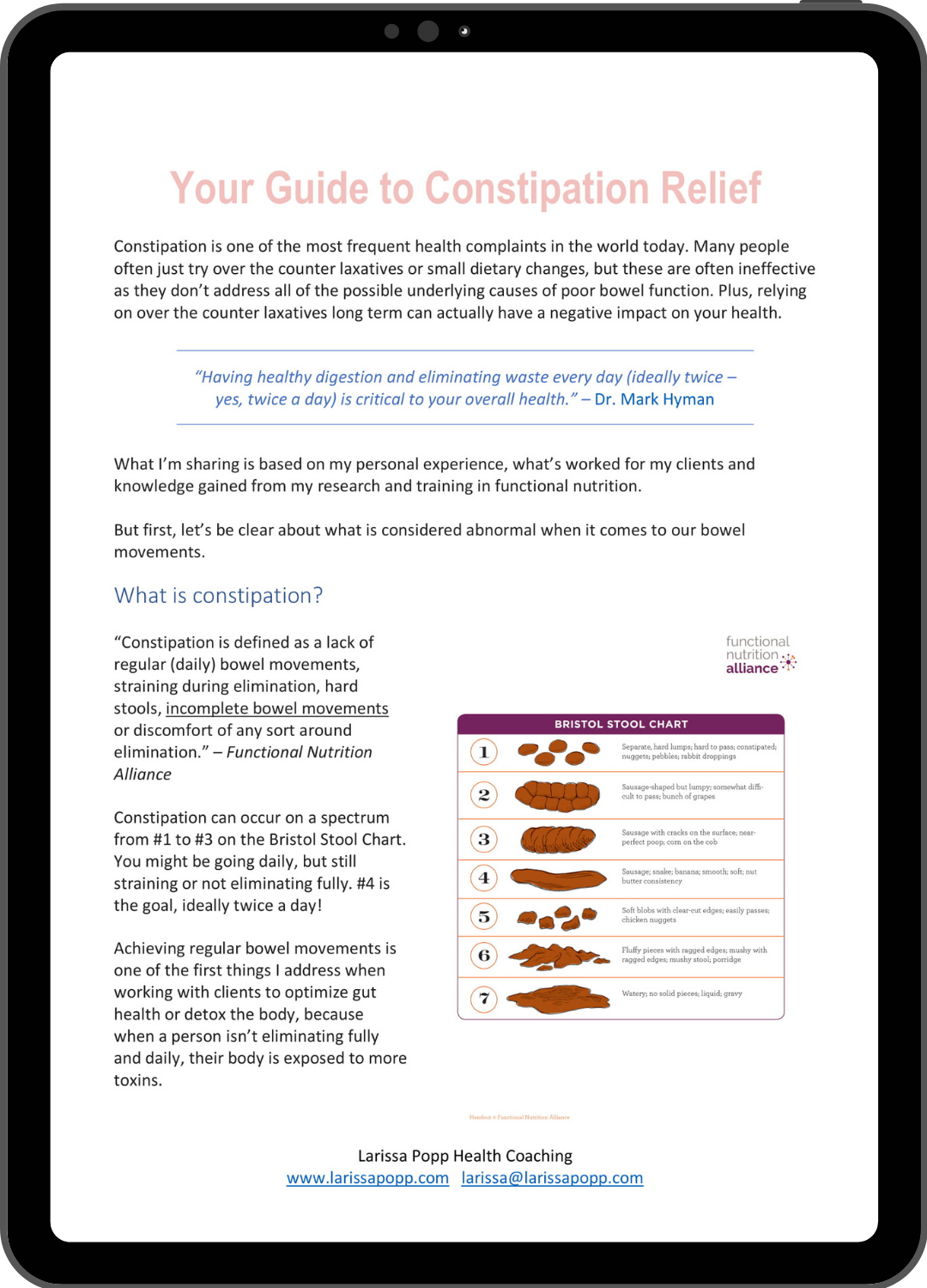It’s almost Thanksgiving! Which means the start of the holiday eating season. Wouldn’t you love to make it through all the festivities feeling great!? To help you out, I’m sharing 10 tips to help you optimize your digestion so you can feel energetic and bloat-free after your Thanksgiving and other holiday feasts. These tips are based on what I learned as part of the Functional Nutrition Alliance’s Digestive Intensive course.
1. Take a few deep breathes and relax before eating
If you eat in a stressed state, you will certainly end up with a tummy ache. Simply taking a few deep belly breathes prior to starting your meal (and taking time for gratitude – tip #5), you can switch your body from fight or flight mode to rest and digest mode.
2. Take time for gratitude
Before starting your meal, take time to give thanks for your meal. It can simply mean taking a few moments before you eat to pause and reflect on what you have to be grateful for. In doing this you are actually activating the cephalic phase of digestion in which your brain signals saliva to release and gets your digestive fires going.
3. Boost stomach acid
If you frequently get heartburn, or experience a lot of belching, gas, fatigue or headaches after meals, this could be due to low stomach acid. Yes, I did just say that heartburn is likely a sign that you have low stomach acid (not too much stomach acid, as people often wrongly think). Therefore, you do not want to take antacids, but instead you want to gently boost stomach acid. Try adding fresh lemon juice to your water throughout the day prior to the Thanksgiving feast, or add one tablespoon of raw fermented apple cider vinegar (Braggs is the brand I use) to a glass of water in the morning and/or 20-30 minutes before your meal.
4. Increase your digestive enzymes
Digestive enzymes are needed for the breakdown of fat, carbohydrates and protein. However, many people lack sufficient digestive enzymes to properly digest their food. The best source of these are from raw foods so make sure you have a fresh salad with your Thanksgiving feast – and if you’re going to be eating at someone else’s house, offer to bring a salad along if it’s not on the menu.
However, if you often experience digestive problems then I suggest taking a high quality digestive supplement such as this one, which I recommend because the enzymes come from organic whole foods, and it also includes a potent blend of probiotics & prebiotics which also support healthy digestion.
I always like to take a digestive enzyme supplement at the start of meals when I might be indulging in some gluten- and dairy-containing foods (which I usually avoid), and Thanksgiving is one of those times! The supplement I use helps to break down the difficult to digest proteins.
5. Drink water before your meal & avoid cold beverages with your meal
Water is actually one of the top nutrients for digestion. The stomach needs water for digestion. Water hydrates the mucosal lining (i.e. your stomach wall), which supports the small intestine bacteria for proper digestion and absorption of nutrients. A lack of water in the digestive system can result in ulcers, indigestion, heartburn, fatigue, brain fog, memory loss, and constipation. However, make sure you drink most of your water up to 20-30 minutes prior to your meal, and avoid drinking a lot of water with your meal – especially cold water, or other cold beverages which slows down digestion.
6. Sip on ginger tea or an herbal infusion before, during, and/or after your meal
My favorite is fresh ginger tea; sipping on it 20-30 minutes prior to your meal will help stoke your digestive fire. And sipping on it post-meal will also aid in digestion. Or make an herbal infusion for increased digestive support. Boil any or all of the following for 10-20 minutes with water, then drink to reduce gas and bloating — fennel seeds, cumin seeds, cardamom, and/or mint.
Or simply chew on a fresh piece of ginger or some fennel seeds on their own.
7. Fill half your plate with veggies
Fill at least half your plate with veggies first, rather than potatoes and stuffing. If you’re the one cooking, try to choose recipes using only whole food ingredients. Look for healthier versions of your Thanksgiving favorites, or try making at least one new veggie side dish this year (such as a big Autumn Kale Salad – I love kale salads not only because they are so nutrient dense and taste great, but they also keep well as leftovers). See end of post for more recipe suggestions.
8. Remember the 80/20 Rule: Stop eating when you’re 80% full
This may seem impossible on Thanksgiving, but try to stop eating when your stomach is about 80% full – at least until it’s dessert time (smile). You’ll enjoy your dessert much more when you don’t feel like you’re over-stuffing yourself, and your food will digest better too. Remember that Thanksgiving isn’t just about the food – right? And also remember that leftovers can be equally delicious.
Eat mindfully and truly enjoy what you’re eating, but also try to focus on enjoying the conversation with family/friends between bites. When you slow down you’ll more easily avoid overeating, and when you follow the 80/20 rule you’ll be happy you did, because no one likes that feeling of being overly full.
9. Chew your food well
This is probably the simplest and most effective thing you can do to improve your digestion – both because it will help you to slow down and thus avoid overeating, and because it will enhance the breakdown of your food. Chewing is the start of the mechanical phase of digestion and the longer food is in your mouth it will not only be broken down into smaller pieces from chewing, but the food will also have more time to be mixed with saliva which begins the enzymatic breakdown of your food.
Think about all the hours and effort put into preparing the food and slow down to really savor and appreciate the taste. And avoid chewing and talking at the same time – that definitely won’t help you chew your food well.
10. Rest then Walk
For at least 15 minutes after eating you should first relax. If you want to lie down, lie on your left side and set a timer for 15 minutes so you don’t fall asleep. According to Ayurveda, lying on your left side for 10-15 minutes after a large meal will allow food to stay in the upper portion of the stomach longer, and to empty more effortlessly, thus supporting good digestion. If you lie on your right side, or get up too soon the food can be hurried and forced out of the stomach prematurely. (1,2) I have actually just recently read about this so I can’t tell you how effective it is – but give it a try and find out for yourself!
After your 15 minute rest, take a short gentle walk to help stimulate your digestion (but don’t walk immediately after finishing your meal). And about an hour later, go for a brisk walk. Moving your body helps move your intestines too and thus will aid digestion, and prevent constipation, but you don’t want to do any vigorous activity or sleep within an hour of eating.
Thanksgiving Recipe Suggestions
Below are a few of my favorite plant-based recipe sites and links to Thanksgiving recipe ideas:
Minimalist Baker – This is one of my go-to sites for easy, healthy & delicious plant-based recipes. If you’re looking for gluten, dairy-free or vegan dessert ideas, she has a lot of amazing ones to try!
Cookie + Kate
- 30 Vegetarian Thanksgiving Recipes
- Autumn Kale Salad — If they had kale, fennel, cranberries, and honeycrisp apples here in Iraq, I would for sure be making this salad for Thanksgiving!
Oh She Glows
- Make-ahead Thanksgiving Panzanella – If the Autumn kale salad doesn’t interest you, perhaps this one will.
Joyful Belly — This site has ayurvedic recipes that are especially great for optimizing digestion.
Green Kitchen Stories
- Holiday Stuffed Pumpkin – this is sure to impress!
Detoxinista
- Healthy Thanksgiving recipes, paleo and vegan friendly – Try the mashed cauliflower “potatoes”, grain-free stuffing, or clean green bean casserole for healthier and lighter versions of Thanksgiving favorites. You may be pleasantly surprised!



Great tips! I went to the farmers market and the Autumn Kale Salad will be a featured side on our Thanksgiving table. Thank you.